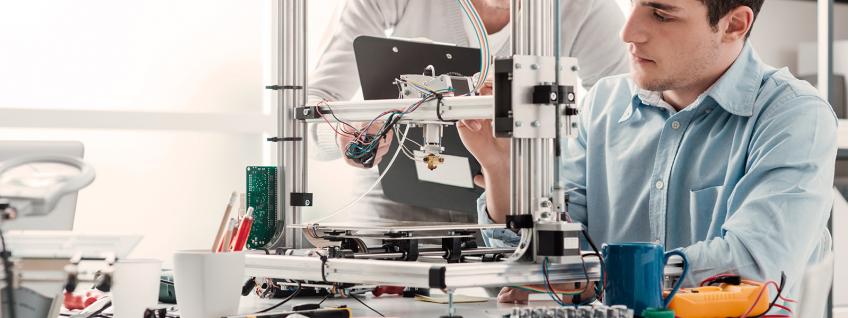Flexible manufacturing cell FMS-200
It is a didactic and modular system that simulates an industrial assembly process. It contains 8 stations; each one controlled by a Siemens PLC (S7-300), among which it is worth pointing out the station for verifying the correct assembly of a piece thorough artificial vision, and the one for the storage through two lineal axis and step by step motors.
Most of the cell’s actuators are pneumatics (simple and double effect cylinders) and the implemented industrial communications are: MPI, PROFIBUS, ASi and Ethernet. Each station incorporates a module that generates breakdowns which permit to evaluate the reliability and robustness of the programs created by the students.
This equipment has a big pedagogical value since it allows programming separately in each station, which is very useful for beginners, and also programming all the stations at the same time which permits to understand the importance of good management and coordination in the development of automated production projects.
Besides the necessary software for the PLC’s (Simatic Step7) programming, we also have the (WinCC) software to implement applications that let supervising and controlling the cell thorough computers or tactile screens (SCADA applications).
Regulation and IPC-201c control module
It is a module that simulates the beverages production process and allow regulation and control of the temperature, level, pressure and flow rate variables. The process is controlled by a Schneider Electric PLC (TSX_Premium) that dispose of an Ethernet connection integrated in the CPU.
This module encourages learning the concepts related with the control and regulation of analogical variables (temperature, level, pressure and flow rate) and complements the acquired knowledge with the FMS-200 where most of the variables are digital.
Assembly station with a robot arm (RV-2AJ)
It is an application that simulates the assembly process of a piece in which an industrial robotic arm takes part. Most of the sensors and pneumatic elements as the robotic arm are controlled by a Schneider Electric PLC (TSX_Premium) and a Magelis tactile screen. Aside from the Ethernet communication integrated in the CPU, the PLC also has CANopen communication.
This application’s main objective is to learn about controlling and programming industrial robotic arms. This is possible thanks to the COSIMIR software, which permit to verify the program before transferring through a 3D simulating environment.
Motor control station
This is an application designed for teaching the main kinds of controlling motors that may be found in the industry. It allows acquiring the necessary knowledge to choose the correct control depending on the situation.
It consists in four modules:
- Module of star-triangle starter for induction motors
- Module of progressive starting and stopping for induction motors, through Schneider Electric’s motor starter Tesys.
- Module of velocity control of induction motors through a Schneider Electric’s Variable Speed Drive Altivar
- Module of velocity control, position and pair of brushless servo motors: this module consists in two lineal axis governed each one by a position controller TwinLine. The group is controlled by a TSX_Premium PLC with two specific modules of axis controlling.
